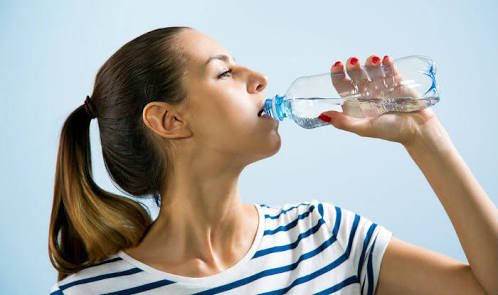Contents
Drinking 1,5 liters of water a day, a myth?

The body’s water requirements are specific to a person’s morphology, lifestyle and climate. Water makes up about 60% of the body’s weight. But every day, a significant amount escapes from the body. Studies show that the body of an average person expends more than 2 liters of water per day. The excess is mainly eliminated by the urine, which is used to evacuate the waste produced by the body, but also by the means of breathing, sweating and tears. These losses are compensated by food, which represents around a liter, and liquids that we drink.
It is therefore necessary to hydrate yourself throughout the day, even when thirst is not felt. Indeed, with aging, people feel less need to drink and risks of dehydration are possible. Just as in case of high temperatures (heat causes additional loss of water), physical exertion, breastfeeding and illness, it is advisable to ensure proper hydration of the body. The risk of dehydration is defined by body weight, and may be due to insufficient and prolonged water consumption. The first signs of chronic dehydration can be dark-colored urine, a feeling of dryness in the mouth and throat, headaches and dizziness, as well as very dry skin and intolerance to blood. heat. In order to remedy this, it is advisable to drink as much as possible, although some studies have shown that taking too much water can be dangerous.
Drinking too much would be bad for your health
Consuming too much fluid in the body too quickly, called hyponatremia, could be harmful. These would not be supported by the kidneys, which can only regulate a liter and a half of water per hour. This is because drinking too much water causes the cells in the blood to swell, which could cause brain function problems. The concentration of the intra-plasma sodium ion is greatly reduced because of the large presence of water in the plasma. However, hyponatremia most often results from pathologies such as potomania or an excess of infusions: cases of this disorder remain rare and only concern a tiny number of people.
Variable recommendations
Studies have been carried out in order to define what would be the real need for water in the body. The figures vary between 1 and 3 liters per day, it is advisable to drink about two liters daily. But as we have seen previously, it depends on the morphology, environment and lifestyle of the person. This assertion must therefore be qualified, and placed in the contexts to which it belongs. These two liters do not include water in the true sense of the term, but all the liquids that pass through food and water-based drinks (tea, coffee, juice). The theory of 8 glasses therefore designates the totality of liquids consumed during a day. This recommendation originated in a study by the Institute of Medicine, which suggested that each calorie of food ingested was equal to one milliliter of water. Thus, consuming 1 calories per day is equivalent to 900 mL of water (1 L). The confusion arose when people forgot that the food already contained water, so it would not be necessary to drink 900 liters of additional water. However, other studies claim the opposite: according to them, it should consume between 1,9 and 2 liters in addition to the diet.
The answer then remains vague and impossible to define, because a lot of research contradicts each other and each gives different results. The recommendation to drink 1,5 liters of water per day can be considered a myth, but it is still necessary to ensure its good hydration throughout the day for the good of your body.
Sources British Nutrition Foundation (Ed.). Nutrition Basics — Liquids for life, nutrition.org.uk. www.nutrition.org.uk European Food Information Council (EUFIC). Hydration – essential for your well-being, EUFIC. . www.eufic.org Noakes, T. Nutrition Issues in Gastroenteroly (August 2014), Sharon Bergquist, Chris McStay, MD, FACEP, FAWM, Director of Clinical Operations, Department of Medical Emergencies, Colorado School of Medicine. Mayo Foundation for Medical Education and Research (Ed). Food and Nutrition Center — Water: How much should you drink every day?, MayoClinic.com http://www.mayoclinic.org/healthy-living/nutrition-and-healthy-eating/in-depth/water/art-20044256?pg=2 Dominique Armand, Researcher at the CNRS. Scientific file: water. (2013). http://www.cnrs.fr/cw/dossiers/doseau/decouv/usages/eauOrga.html |










